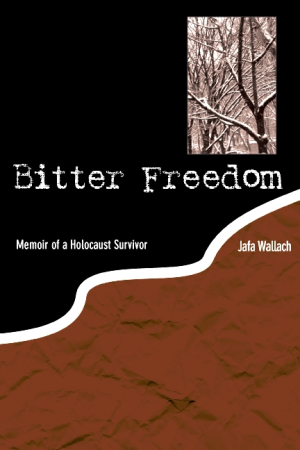
Bitter Freedom
Memoir of a Holocaust Survivor
“Five minutes to liberation; four minutes to death,” writes Jafa Wallach in, Bitter Freedom: Memoir of a Holocaust Survivor. This shocking, terrifying statement catapults the reader into German-occupied Poland in December 1942, when the author thought liberation imminent.
An accurate tally of Holocaust survivors alive today is elusive and varies from source to source. What does not vary is the Jewish cultural mantra, “we must never forget.” And, what is certain is the miracle of Jafa Wallach’s long life—she died at the age of 101 in 2011—permitting her to draft and reflect upon a memoir that is a visceral testament to an unparalleled atrocity.
Wallach spent twenty months with her husband and three grown siblings hiding underground in a space that was six-by-four-and-a-half feet and just under four feet at the tallest point. This insect-infested space was shorter and narrower than a queen-size bed. Given the dimensions, muscles that had not been used for just shy of two years were of little concern to Wallach when, “at 11 in the morning of September 15, 1944, we left Józio’s house, hobbling weakly on canes but strong in our resolution. We tottered through the town in which 5,000 Jews had once lived. We were all that remained alive of these, we and two others.”
Why read Bitter Freedom? Because it is a no-holds-barred account of a grotesque existence that did not stamp out Wallach’s faith in God; because the suffering Wallach endured for years did not dampen her empathy for others, which was evidenced in her concern for her protectors (Józio and his family) and those suffering alongside her. Micro amounts of food were shared not only with those who came begging on a near-daily basis, but with the animal inhabitants of Wallach’s hiding space. Her husband, Natan, a physician, matched his wife’s generosity and concern for humankind as he continued providing medical services at the behest of the government under extreme circumstances, including lack of equipment, medications, and a tsunami of paperwork and quotas.
The author’s daughter, Rena, the only surviving child born in the area of Poland formerly home to 30,000 Jews, adds her memories along with those of her Aunt, Helena Manaster, to this memoir—corroborating points of view from family members is unusual in memoirs of the Holocaust due to the annihilation of complete families.
Wallach’s words are never bitter, and her belief in survival, God, and mankind is astonishing. “We heard the bombers more often now. We met each air raid with prayer. My heart and thoughts were always, always with you. God would save you, I believed, as He had until now.”
“We hadn’t washed in over a year. One could not imagine that we would have been able to survive this way for so long, but we did.” Reading Bitter Freedom with the mind-set of 2012, where everything possible is done to avoid discomfort of any kind, even for a millisecond, it is mind boggling to suspend the twenty-first century, enter Wallach’s world, and imagine the bravery and unwavering hope necessary to survive.
The memoir genre has become tainted and overwrought in recent years with the highly publicized unmasking of fictionalized “remembrances” employed to spice up the story line. Bitter Freedom is a fine example of a tautly written account that needs nothing but facts and one woman’s commitment to the telling of these facts to make this an exceptional read.
Reviewed by
Dindy Yokel
Disclosure: This article is not an endorsement, but a review. The publisher of this book provided free copies of the book and paid a small fee to have their book reviewed by a professional reviewer. Foreword Reviews and Clarion Reviews make no guarantee that the publisher will receive a positive review. Foreword Magazine, Inc. is disclosing this in accordance with the Federal Trade Commission’s 16 CFR, Part 255.
